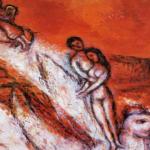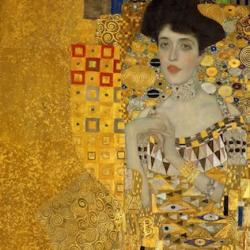Proverbs 31:10-12 describe the strong woman’s worth and value to her husband in general terms, but the section from verses 13-22 (the “dalet” through the “mem” sections) provides a detailed account of her dealings. The activities described in these ten verses are like a Decalogue of Wisdom, the Decalogue of the strong wife.
One of the important typological dimensions of this description is an implicit link between the bride of this song and the Bride of Yahweh, the Bride of Christ, the church. Like this woman, the Bride of Christ is a jeweled bride, sparkling with the glory of her Lord as she descends from heaven. This woman gathers materials for clothing, as Israel gathered wool and linen and other materials for the tabernacle. This woman feeds her family, as the church spreads Christ’s table before His family.
This is part of the larger imagery of verse 13: the strong wife seeks wool and flax, materials for priestly garments, and works delightedly, willingly, like those who contributed to the tabernacle. She is also like the church in being like a “ship” (v. 14), traveling across the Gentile sea to bring good news to the world and Gentile goods back home from a distant country. Specifically, the woman-ship brings bread from afar.
Like Israel at Passover, the strong woman rises at night to give food to her household. The word for “food” here is literally “prey,” and suggests that the woman is not only a provider of food in the dark, but a huntress or a lioness who brings the prey back to her family. Again, the picture is a heroic, even masculine one. She distributes portions to her maidens – portions of food, no doubt, but the picture is also of the distribution of property. Mother Israel distributes portions to the maiden cities of Israel; mother Jerusalem is attended by her maidservants, what the Song of Songs calls the “daughters of Jerusalem.”
Verse 16 highlights her sacramental role. She purchases a field, in order to provide wheat and bread to her house; she plants a vineyard, in order to provide wine. The woman again is Israel, not merely the strong woman who is a bride of a man, or Lady Wisdom, but the Bride of Yahweh and Yahweh incarnate who gives bread and wine to her children.
Verse 17 moves from a commercial to a military context. Like a mighty man girding on his armor or his sword, the woman girds herself with strength. Though “strength” is here a different word from that at the beginning of the passage (‘oz), it has the same range of connotation – power, wealth, strength, military prowess. Her harms are strong, like the arms of Yahweh Himself who defeated Egypt with the strength of His arm (Exodus 15:16). Literally, once again, the woman is engaged in economic and domestic tasks, but these are elevated by the military and epic language that the poet uses.
Earlier in the passage, we noted an allusion to Eve. The strong woman is not an Eve who brings evil on her husband, but a new Eve who brings good and not evil. We again have a reference to Eve in verse 18. Eve saw the fruit of the tree of knowledge, that it was delightful to the eyes, good for food, and able to make one wise. She was right on all counts, but was wrong to think this was an encouragement to eat. The strong woman is again a new Eve who perceives the good of the things she buys (the word is “taste,” ta’am). She had good taste, knowing what is good and when to take it.
Most of the uses of the word nyr, “lamp,” refer to the lamps of the tabernacle (Exodus 25:37; 27:20; 30:7-8; Leviticus 24:2, 4; Numbers 4:9; 8:2-3; 1 Samuel 3:3; 1 Kings 7:49). Like the priests, the strong woman keeps the lamp burning perpetually, a light in the night. Once again, the woman is Israel. No doubt this is also meant to be a description of her own luminous character and work: She is a light that burns perpetually, whose good works are displayed so that men may see them and glorify the Father in heaven. Keeping the light of the temple shining, and her own light bright, Israel is the first form of the glorious lighted city that descends from heaven (Revelation 22).
Her hands are busy spinning but they are also stretched out to the poor (v. 20). Typically, stretching out a hand also has a military connotation. Yahweh stretches out his hand against Egypt to destroy it. If the strong woman is stretching out a hand to help the poor, it is because her hands are not only full of gifts but also strong in grappling with oppressors.
The specific word for “stretch out” here (paras) carries the sense of “spread out.” Moses “spreads out” his hands in prayer (Exodus 9:29, 33), the cherubim spread their wings over the ark cover (Exodus 25:20; 37:9; 40:19), and various layers of covering are spread out over the furnishings of the tabernacle (Numbers 4:6-8). Yahweh Himself spreads out His cloud to cover Israel (Psalm 105:39).
This is not only an image of generosity but of protective covering. The afflicted have an ally and support in the strong woman. She uses her strength/wealth/influence to assist those who are in need. Of course, here again we have an image of the church, stretching out her hands to the Lord in prayer on behalf of the needy, stretching out her hands in gifts to the poor, stretching out her hands against the wicked who trample down the weak.
The clothing of the house in scarlet is again a tabernacle reference. Scarlet is one of the main colors of the tabernacle furnishings, and of the priestly garments (Exodus 25:4; 26:1, 31, 36; 27:16; 28:5;, 6, 8, 15). Israel is the willing contributor to the building of her “house,” the house of her ba’al, Yahweh, giving scarlet and purple along with gold and silver and bronze for the building of the house. Purple is also a tabernacle color (Exodus 25:4; 26:1, 31; etc.). These are also royal colors: Not only the strong woman herself, but her entire household is dressed in the colors of kings.












